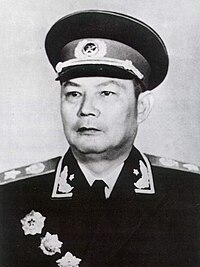Ye Jianying
Ye Jianying ( Chinese 葉劍英 / 叶剑英 , Pinyin Yè Jiànyīng , W.-G. Yeh Chien-ying ; born April 28, 1897 in Meixian County, Guangdong Province ; † October 22, 1986 in Beijing ) was a Chinese communist general from 1978 to 1983 as chairman of the Standing Committee of the National people's Congress acting President of the people's Republic of China .
Life
He was born as Ye Yiwei ( 葉宜偉 , Yè Yíwěi ) into a wealthy merchant family. His coming of age name was Cangbai ( 滄 白 , Cāngbái ).
He belonged to the Hakka minority in Guangdong Province. After graduating from Yunnan Military Academy in 1920, he joined Sun Yat-sen and the Kuomintang (KMT). In 1922 he served as part of Sun Yat-sen's bodyguard. In 1924, he became an assistant director at the Whampoa Military Academy . In 1927 he joined the communist party . During his desertion to the communists, he passed on military secrets of the KMT and took part in the 1927 failed uprisings in Nanchang and Guangzhou. He fled to Hong Kong with Zhou Enlai and Ye Ting . He then traveled to the Soviet Union and then studied military science in Moscow . After his return to China in 1932 he became chief of staff of the Fourth Front Army under the command of Zhang Guotao , which was involved in the attempt with the Soviet of Jiangxi to establish a communist counter-state to the KMT. Ye Jianjing joined the Long March in Sichuan in 1935 . After the end of the Long March he assumed a high military administration position. After the Japanese attack on China , he became Chief of Staff of the 8th Army Route . In 1941 he became chief of staff of the Central Revolutionary Military Committee . After the resurgence of the Chinese Civil War , he was secretary of the Revolutionary Military Committee of the Central Committee and took over the evacuation of communist cadres from the areas threatened by the KMT. In 1949 he served as the commander in the capture of Beijing and became the city's first communist mayor after the occupation.
In 1954 he became the head of the armaments procurement commission of the People's Liberation Army . In the following year he became General Inspector for Exercise. In 1955 he was promoted to marshal. In 1955 he became the first president and at the same time political commissar of the Academy for Military Science of the People's Republic of China. In 1961 he became a member of the country's Central Military Committee. Ye Jianying advocated the modernization and professionalization of the People's Liberation Army. In the course of the cultural revolution from 1966 onwards, however, his work was destroyed by the destruction of the structures that had been created. In 1967 he supported an attempted coup against the Gang of Four . However, he escaped punishment and was appointed Minister of Defense by Mao in 1975. Ye Jianying supported Deng Xiaoping's rise by feigning resignation due to illness, which was seen as a sign of a lack of military support for the Gang of Four. In 1976, he was one of the leading military and party conspirators who deposed Jiang Qing and the Gang of Four, and was instrumental in planning their arrest.
He lost the position of deputy party chairman in 1982 when it was abolished and resigned from the Politburo in September 1985. He died in Beijing at the age of 89 .
Publications
- Report on the amendment of the party statutes. (in: The XI. Congress of the Communist Party of China. Documents. Publishing house for foreign language literature, Beijing 1977.)
- Speech on the XII. Chinese Communist Party Congress. (in: The XII Congress of the Communist Party of China. Documents. Foreign Language Literature Publishing House, Beijing 1982.)
Individual evidence
- ↑ a b Dr. Christopher Lew: Ye Jianying. in Xiaobing Li: China at War - An Encyclopedia. Oxford, 2012, pp. 514-517
| personal data | |
|---|---|
| SURNAME | Ye Jianying |
| ALTERNATIVE NAMES | Ye Yiwei |
| BRIEF DESCRIPTION | Chinese field marshal and politician |
| DATE OF BIRTH | April 28, 1897 |
| PLACE OF BIRTH | County Meixian , Province of Guangdong , China |
| DATE OF DEATH | October 22, 1986 |
| Place of death | Beijing |

